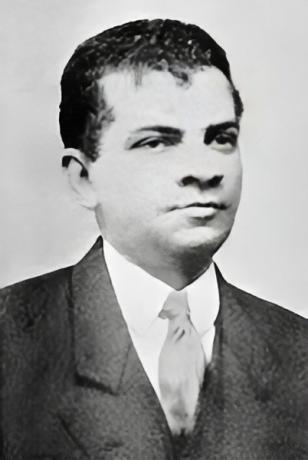Sad end of Policarpo Lent is the best known novel by Lima Barreto. This work tells the story of Major Quaresma, a man whose exaggerated patriotism only causes him problems. He has the idea of making Tupi-Guarani the official language of Brazil and is dedicated to national agriculture, but he is defeated by the saúva ants.
The protagonist, one of the best known characters of Pre-Modernism, meets his sad end when he decides to support the dictator Floriano Peixoto during the Revolt of the Armada. In his latest patriotic act, he is forced to face the country's reality and abandon the romantic vision that accompanied him for so long.
Read too: The backlands — work that inaugurates Pre-Modernism
work summary Sad end of Policarpo Lent
Sad end of Policarpo Lent is a pre-modernist novel by Lima Barreto.
The work ironizes Romanticism, represented by the eccentric protagonist of the book.
The narrative takes place in Rio de Janeiro, in the early years of the Republic.
The book highlights the customs and political elements of the time.
Its main characteristics are: critical nationalism and anti-romanticism.
Video lesson with the analysis of Sad end of Policarpo Lent
Do not stop now... There's more after the advertising ;)
Analysis of the work Sad end of Policarpo Lent
-
Characters of the work Sad end of Policarpo Lent
Adelaide: sister of Major Quaresma.
Albernaz: general.
Anastácio: Policarpo's employee/aggregate.
Antonino Dutra: lieutenant and clerk.
Armando Borges: Olga's fiance.
Campos: president of the Chamber.
Cavalcanti: Ismenia's fiance.
Doctor Rocha: Bachelor of Law.
Felizardo: employee of Quaresma.
Floriano Peixoto: president of the republic.
Genelicio: clerk and boyfriend of Quinota.
Ismenia: daughter of Albernaz.
Lalá, Quinota and Zizi: sisters of Ismenia.
Maricota: wife of Albernaz.
Olga: goddaughter of Lent.
Policarpo Quaresma: protagonist.
Ricardo Coração dos Outros: singer poet of modinhas.
Vicente Coleoni: compadre of Polycarp.
construction time Sad end of Policarpo Lent
THE narrative takes place in the first years after the Proclamation of the Republic, that is, during the rule of the marshal Floriano Peixoto, between 1891 and 1894.
construction space Sad end of Policarpo Lent
THE action takes place in Rio de Janeiro. Quaresma lives in a house in the neighborhood of São Cristóvão. Later, he is hospitalized at the Praia das Saudades hospice. Afterwards, he will live at the Sossego farm, “two hours from Rio”, in Curuzu.
plot of the work Sad end of Policarpo Lent
O Major Lent he works as an undersecretary at the War Arsenal. Extremely patriotic, he defends the greatness of his land in relation to foreign lands. His patriotism earns him the nickname Ubirajara. The protagonist “studied the country, in its natural resources, in its history, in its geography, in its literature and in its politics”.
Ricardo Coração dos Outros tries to teach Quaresma how to play the guitar, since the major “had been thinking about what it would be for a long time. the poetic-musical expression characteristic of the national soul" and "acquired certainty that it was the modinha accompanied by the guitar". In addition, Policarpo goes in search of an old poet, “a stubborn cultivator of Brazilian folk tales and songs”.
The character then starts to study the Tupinambá customs. Thus, when he received his friend and his daughter at home, “he broke down crying, screaming, pulling his hair, as if he had lost his wife or a child”. The visitors are stunned, until Quaresma explains to them that shaking hands is not “ours”.
According to him, “our greeting is to cry when we meet friends, that's how the Tupinambás did”. For this reason, compadre Vicente and Quaresma's sister, Dona Adelaide, even doubt the man's sanity. And, on another occasion, the major, who is already a laughingstock at the department, becomes the target of general ridicule, including journalists, when he sends an application to the Chamber.
In it, Policarpo, “using the right conferred on him by the Constitution, comes to ask the National Congress to decree Tupi-Guarani as the official and national language of the Brazilian people”. Furthermore, he is so dedicated to the study of Tupi that he ends up writing a letter in that language, which, upon arriving at the ministry, causes a lot of confusion.
The director of the arsenal calls Quaresma to his office and, angrily, suspends the major. Later, considered crazy, Polycarp is admitted to a madhouse, where it stays for six months. Retired, he buys a farm, which he calls Sossego. There, he surrenders to a new nationalist passion, the agricultural dream, “not for the purpose of making a fortune, but because there is in this one more demonstration of the excellence of Brazil”.
In his new home, he is visited by Ricardo and the newlywed Olga, who, during a walk around the area, is impressed by “the misery in general, the lack of cultivation, the poverty of the houses, the sad, dejected air of the poor", as "I had the idea that the farmers were happy, healthy and happy”.
The major, then, finds himself in a futile war against the saúvas. To complicate matters, he starts to suffer political persecution. Finally, decides to leave Sossego and return to the capital to support President Floriano Peixoto (1839–1895), during the Angry armada. Thus, the protagonist volunteers to fight alongside the marshal, but Coração dos Outros is forced to serve.
In a conversation with Floriano Peixoto, the president calls Quaresma a visionary. However, as the armed conflict progresses, the major realizes the inconsistency of all that. His sad end then approaches, when he is arrested for protesting the treatment of prisoners.
Before its end, however, Quaresma gives in to disillusionment, realizing that all patriotism led him to unhappiness, since “his life was a disappointment, a series, better, a chain of disappointments” and the “homeland he wanted to have was a myth; it was a ghost created by him in the silence of his office”.
Ricardo Coração dos Outros strives to avoid the sad end of Policarpo Quaresma. Olga also tries to help, when trying to be received by Marshal Floriano Peixoto, but can only speak to a “secretary or aide den”, who calls Quaresma a traitor.
narrator of the work Sad end of Policarpo Lent
The narrative has a storyteller omniscient, able to know the deepest feelings and thoughts of the characters. Furthermore, he is opinionated as he analyzes the facts and makes judgments about them.
Characteristics of the work Sad end of Policarpo Lent
O romance, published in 1915, is divided into three parts. Each of them has five chapters. In addition to narrating the protagonist's story, he also recounts facts of the life of those around him (such as his goddaughter Olga), shows suburban characteristics and discusses political issues at the time.
This novel is inserted in the Pre-Mmodernism, literary period beginning in 1902 and ending in 1922. Books from that era present critical nationalism, lack of idealization, and sociopolitical criticism. Realistic in character, they bring an anti-romantic vision of reality, as evidenced by Major Quaresma's trajectory.
Read too: Angústia — novel by Graciliano Ramos
Lima Barreto

Afonso Henriques de Lima Barreto he was born on May 13, 1881, in the city of Rio de Janeiro. He lost his mother at the age of six, when he was raised only by his father, a printer. However, due to the influence of the rich godfather, he managed to study at Liceu Popular Niteroiense and Colégio Pedro II.
In 1897, he began to study engineering but did not complete the course. Then, in 1903, he entered the public service. Later, in 1909, he published his first novel — Memories of the Registrar Isaiah Caminha — which talks about racial prejudice. However, the writer became an alcoholic, was hospitalized more than once and died on November 1, 1922, in Rio de Janeiro. To learn more about the author, read: Lima Barreto.
movie about Sad end of Policarpo Lent
Title: Policarpo Quaresma: hero of Brazil.
Adapted script: Alcione Araújo (1945–2012).
Direction: Paulo Thiago (1945–2021).
Main actor: Paulo José (1937–2021).
Genre: comedy.
Year: 1998.
Parents: Brazil.
Category: feature film, 123 min.
-
Awards:
Estação Botafogo Award for Brazilian Cinema.
Best film, by the popular jury, at the Film and Video Festival.
Best Actor, for Paulo José, at the Film and Video Festival.
Best direction, for Paulo Thiago, at the Latin American Film Festival.
Historical context of Sad end of Policarpo Lent
In 1889, the monarchy came to an end to make way for the republican regime. From there, a process of reform of urban centers in large cities began, with the aim of replacing Portuguese architecture with a modern space. In Rio de Janeiro, such reforms became known as “bottom-up”, beginning in 1902.
As a result, the tenements were extinguished, from where the poor residents moved to spaces that, later, were called favelas. Many of its inhabitants were freed slaves in the year 1888 and their descendants. But poverty was not restricted to the Southeast. In the Northeast of the country, the drought contributed to the increase in poverty.
On the other hand, coffee was the wealth of São Paulo farmers, who also held political power during the historical period known as old republic, which lasted from 1889 to 1930. Thus, the Brazil presented evident social problems and inevitable political conflicts.
During the first years of the republican government, the Revolta da Armada took place in Rio de Janeiro, between 1891 and 1894. This movement was promoted by members of the Navy who intended to depose President Floriano Peixoto. However, they gained neither popular nor army support, so the movement was harshly contained.
Image credits
[1] ANDdictator L&PM (reproduction)
by Warley Souza
Literature teacher

